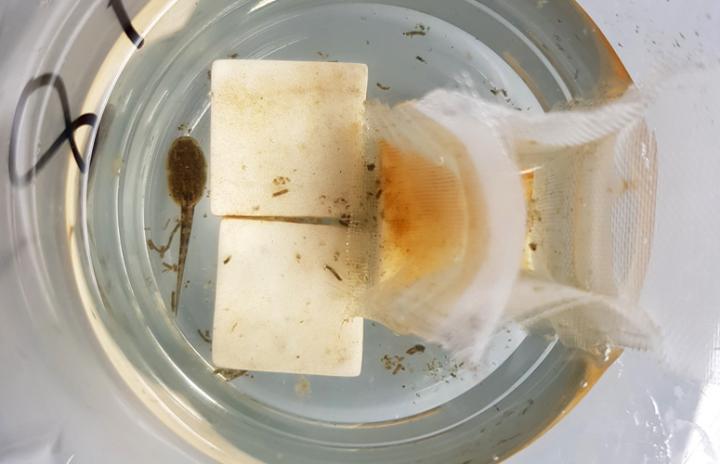A study by the UPV/EHU-University of the Basque Country has demonstrated that 15 days’ exposure to microplastics affects some freshwater systems

Credit: Naiara López
Concern about contamination caused by microplastics is growing; owing to their abundance, ubiquity and persistence over time, microplastics pose a potential risk for organisms and ecosystems. Yet studies into their distribution in freshwater systems, in both lakes and rivers, and their effects on the organisms in these waters are few and far between, and there is very little information about their potential effect on the functioning of these ecosystems.
In this context, in collaboration with the National Museum of Natural Sciences (CSIC-National Research Council) in Madrid, the UPV/EHU’s Stream Ecology research group has studied “the effects of microplastics on freshwater ecosystems and on two of the most important groups of organisms that live in them: amphibians and invertebrates”, explained Naiara López-Rojo, researcher in the UPV/EHU group. To do this they conducted lab experiments in which they replicated the conditions of the rivers and ponds where these animals live, and exposed them to different concentrations of fluorescent microplastics: “Replicas without microplastics (control), at a low, at an intermediate and at a high concentration, while the remaining characteristics were identical (light, temperature, etc.).”
That way the group studied firstly the effect of the microplastics on tadpole survival, food and growth as well as the ingestion and egestion of them. In addition “we analysed whether the microplastics attach themselves to periphyton (set of microscopic organisms that grow on the rocks at the bottom of the river or pond and main source of food for the tadpoles) and whether their productivity changes, because that would demonstrate an alteration in the way freshwater ecosystems function”, said the researcher. Secondly, they examined the effects of the microplastics on the decomposition of the leaf litter (one of the most important processes in river ecosystems) and on the survival and growth of organisms that feed on it (detritivore invertebrates); they also studied the degree of attachment of the microplastics to the leaf litter and degree of ingestion and egestion of the detritivores, thus evaluating the trophic transfer mechanisms of the microplastics.
Combination with other stressors
The results demonstrate that “microplastics cause mortality in detritivores in all their concentrations (in the highest concentration mortality is nine times higher) but their growth is not affected. In the case of tadpoles, we saw that they die in the highest concentration of microplastics; in the other concentrations we did not see any lethality, but we did see a reduction in the growth of the amphibians”, added López-Rojo.
The fluorescence studies conducted on the tadpoles indicate, according to the researcher, “a presence of microplastics in the organisms, in their faeces and in the periphyton. And that suggests that microplastics could be significant stressors for amphibians, like other contaminants, climate change, habitat loss, etc. Amphibians could also be a significant transmission channel of freshwater microplastics to terrestrial ecosystems”. In the case of the invertebrates, the tests suggest that the microplastics were also ingested (very likely through the ingestion of particles attached to the leaf litter) and some of them were excreted. The more the concentration of microplastics increased, the less the leaf litter decomposed. “These results provide fresh evidence of the damaging effects of this contaminant on aquatic insects and on the functioning of river ecosystems, and highlight the need to standardise the methods to be used in future experiments on microplastics to be able to draw comparisons,” concluded the researcher in the UPV/EHU’s Department of Plant Biology and Ecology.
López-Rojo stresses the need to go on exploring the effect of this kind of contaminant on freshwater ecosystems: “We are seeing that the outcome depends on the type of organism you study, exposure time, etc. More prolonged exposure would need to be studied because in actual fact the plastics persist for much longer than 15 days. It would also be interesting to study the effect of this contaminant together with other types of stressors which both rivers and ponds are subjected to. The reason is that the interaction among various stressors could turn out to be even more harmful.”
###
Media Contact
Matxalen Sotillo
[email protected]
34-688-673-770
Original Source
https:/
Related Journal Article
http://dx.




